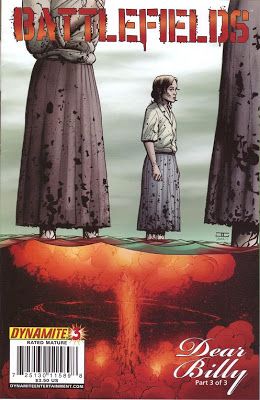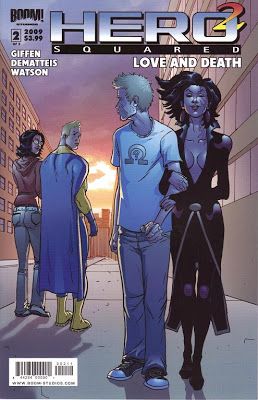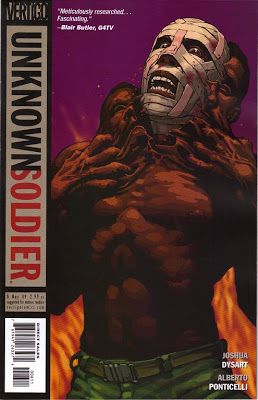After last week's mess, it's back to sanity! Of course, that means far fewer comics and far fewer people telling me I'm crazy, but I can live with that!
Battlefields: Dear Billy #3 (of 3) by Garth Ennis (writer), Peter Snejbjerg (artist), Rob Steen (colorist), and Simon Bowland (letterer). $3.50, 22 pgs, FC, Dynamite Entertainment.
"Dear Billy" ends probably one of the few ways it could, and it's a powerful statement about war and what it does to people. Ennis upsets our expectations mainly because we want Carrie to act a certain way, as does Billy, and when she acts a different way, it's extremely powerful. We also expect Billy to act in a certain way, so Ennis is playing on our anticipation in more ways than one. Billy's naïveté is interesting, not because Carrie hates it (as she points out, she shouldn't expect Billy to be any different), but because of the way Ennis explains it. In three issues, Ennis has done as good as job as explaining the differences between men and women as he did in, say, 66 issues of Preacher. Carrie and Billy simply can't understand each other, and that is the tragedy in this comic. Plus, Snejbjerg gets to draw a massacre, and he does so with horribly glory.
After the first arc of this series, I wasn't sure if I was going to stick with it. If Ennis continues to write stories like this, however, where war is the backdrop but there's a lot more going on, I might have to stick around. Of course, the next arc seems like it's more of a straight-up war tale, but it's drawn by Carlos Ezquerra, so it might be worth checking out. Speaking of worth checking out, "Dear Billy" is definitely that.
Hero Squared: Love and Death #2 (of 3) ("The Middle of the End!") by Keith Giffen (plotter), J. M. DeMatteis (scripter), Nathan Watson (artist), Digikore Studios (colorists), and Ed Dukeshire (letterer). $3.99, 22 pgs, FC, Boom! Studios.
As the Giffen/DeMatteis team's latest superhero epic somewhat languorously moves toward its conclusion (which comes next issue), it's always worth noting that Giffen and DeMatteis are simply without peer among comic book writers in making conversations in comics fun and interesting. Almost this entire comic is devoted to four people talking about their problems, but it's a great read, as Giffen and DeMatteis not only get to the heart of what is "wrong" with most superhero fantasies (I put it in quotes because "wrong" in this case is purely subjective), but also get to the heart of why Milo, Stephie, Captain Valor, and Caliginous are having problems. Sure, the answers to some of their problems are simplistic (why are people in all forms of fiction always scared of being happy?), but the dialogue still feels very naturalistic and organic, and the humor in the series always stems from "realistic" situations (as we are, after all, dealing with a superhero from another dimension). Watson is called upon to draw a lot of facial expressions (until the end, where he gets to draw the Captain Valor Corps, which is neat), and he does a good job with it. He's a bit broader than, say, Kevin Maguire (unsurprisingly, I suppose), but he tells the story quite well.
So next issue we get the end of the saga. All in all, the epic of Captain Valor isn't all that long (I'll have to check, but it's less than 15 issues), but it's a humorous and poignant look at what makes someone a hero. I'll interested to see how Giffen and DeMatteis will wrap everything up.
The Incredible Hercules #127 ("Dark Reign") by Fred van Lente (writer), Greg Pak (writer), Dietrich Smith (penciler), Cory Hamscher (inker), Raúl Treviño (colorist), and Joe Caramagna (letterer). $2.99, 22 pgs, FC, Marvel.
A new arc, building on what has come before, begins and, as usual, it's entertaining. It actually starts slowly, as Pak and van Lente dispatch a minor Marvel hero that I wished they hadn't and Hera challenges Athena, Hercules, and Amadeus in a diner. (I should point out that I don't have any great love for the hero who gets axed, to the point that I didn't know he existed. At first I thought he was a van Lente/Pak creation, but later in the issue I learned he was not. However, the first few pages make him seem like he's filling a nice niche in the Marvel U., and now he's gone. Oh well.) The writing is fine, but doesn't crackle like it often has - it's expository to a large degree, so I just have to get through it. I suppose it probably works for someone who hasn't been reading the book, but I have. And I love how the Furies are hotties in the Marvel U. - every single female in the Marvel U., apparently, is a hottie, more so than in the DCU, it seems. Then Norman Osborn shows up at Hera's place of business, the book takes a darker turn, Delphyne reappears, and things get ugly. The second part of the book picks up a bit, but overall, this is a set-up issue, so not a ton happens. It's not as good as most of the issues of this run have been, but Pak and van Lente are introducing (or re-introducing) a lot of elements, so I'm perfectly willing to let them off the hook.
Smith's art is similar to the others who have come before him. I don't know if Marvel is hiring artists who have similar styles or if the artists are changing their styles to suit the book. Herc's body hair is a bit weird, but when Hera's Olympus Group and Norman Osborn's Faux Avengers show up at the end of the book, Smith does a nice job. And yay! Ares is back to fight Herc. Good times.
I should point out that there are FIVE footnotes in this comic, referencing stuff that didn't even occur in this comic (only one refers to something that happened in this title). It's not distracting at all, and it deepens the connection between this book and the rest of the Marvel U. It seems like Mark Paniccia, the editor, is being a bit goofy with them, but I don't care - I want more! I doubt if there needs to be a ton of effort to do this, so I'm glad this book, at least, utilizes them. FOOTNOTES RULE!!!!
The Umbrella Academy: Dallas #5 (of 6) ("All the Animals in the Zoo") by Gerard Way (writer), Gabriel Bá (artist), Dave Stewart (colorist), and Nate Piekos (letterer). $2.99, 22 pgs, FC, Dark Horse.
You know, at this point, I'm probably better off just re-reading the entire series when issue #6 comes out, because I'm a bit lost. Didn't issue #4 end in a way that seems to beg an explanation? And yet, here we are, back in 1963, in the jungles of Vietnam, and things are weirder than ever. Yes, I love the fact that on one page, a character says "Protect that mummy!" and that on another page, Viet Cong vampires attack our heroes, and that Number Five takes charge of the JFK assassination in a hilarious way, but I'm still confused. It doesn't help that time travel makes my head hurt. I'm just along for the ride right now, soaking in Bá's glorious art. Seriously, the action scenes in this comic are stunning, and the splash page of the jungle is exquisite. I can live with being lost in the story (that's not to say I'm not enjoying it, just that I'm lost) is the art is this good. And it is.
So next issue we find out what's going on. I hope Mister Pennycrumb plays a crucial role!
(The mummy, by the way, was a real person. In case you were wondering and didn't feel like Googling it.)
Unknown Soldier #6 ("Haunted House: Conclusion") by Joshua Dysart (writer), Alberto Ponticelli (artist), Oscar Celestini (colorist), and Clem Robins (letterer). $2.99, 22 pgs, FC, DC/Vertigo.
The first arc of Unknown Soldier comes to an end, and this is usually the spot where I decide if I want to keep buying something or not. I'm going to keep getting this, because Dysart is at least trying something different, even if I'm not sure about his execution. His text pieces, which detail the recent bloody history of Uganda, are more interesting than the actual comic, mainly because in the comic, he seems to be taking a relatively simplistic (from a moralistic standpoint) view of the conflict. Moses, after all, can't stop the war simply by shooting everyone who's evil. While Dysart might be acting out some kind of power fantasy through the book, as he seems to imply from editorial comments in the text piece, that doesn't completely excuse it. Yes, it's a very exciting and harrowing comic, and the way Moses has descended into madness throughout the book is at its heart, and Dysart does that very well, but glossing over the very real decisions people in this region have to make (especially regarding the child soldiers) rubs me the wrong way. Ultimately, any psychological profiling this arc has done is against a backdrop that, as Dysart reminds us, is horrible and, incredibly, ongoing (when was the last time the Congo War or Joseph Kory got any press in the U. S.?), and that cheapens it slightly. Dysart has explained that he wants this to be a kick-ass adventure comic, which is fine to a degree, and if he goes into the real-world politics too much he might lose readers and the book will get cancelled, so I understand the dilemma he's in. I'm going to keep reading, both because Moses's odyssey is fascinating and Ponticelli's art is very good, but I have a feeling I'm going to be worried about this as long as I do read.
At least Dysart is explaining the situation, even if he's doing it in the text pieces. The Ugandan problem is a huge tragedy, and any light on it is good.
And that's the week! I noticed an interesting fact as I was purchasing, reading, and reviewing this week's books in this, the final week of March: I bought one (1) mainstream DC comic this month, and that would be Secret Six. Through cancellations (Blue Beetle and, before that, Catwoman) and creators jumping ship (Morrison on Batman, although he'll be back), I'm just not interested in much of what's coming out of the DCU. That's fairly amazing, considering I've always thought DC published better comics overall than Marvel. I'm not buying a ton of regular Marvel stuff (last week notwithstanding), but I'm still getting more than from DC. Of course, Vertigo is picking up the slack a bit, as the imprint seems to be publishing quite a good bunch of comics recently. It's just something I noticed. I apologize for reading weird books that don't angry up the blood and therefore don't draw grumpy comments about how I'm an idiot. I try, really I do!
No one guessed last week's totally random lyrics, which made me sad. After all my talk about Wolverine's son, couldn't you have guessed I'd go with Dokken lyrics? Yes, the lyrics were from "Dream Warriors," a bad song from a bad movie. But George Lynch can play some guitar, man! Let's get to some new totally random lyrics, shall we?
"Our story begins in a schoolyard
A little girl skipping rope with her friends
A tisket, a tasket, no lunch in her basket
Just school books for the fight she would be in
One day over this hoodie
She got beat for some clothes and her rep
With her chin up, she scolded all y'alls molded
When I'm rich, on your neck I will step
And step she did to the straight A's
Then college, the master degree
She hired the heifers that jumped her
And made everyone of them work for free"
Yeah, I'm not sure what the end of the seventh line means either. But so what? Guess away!






